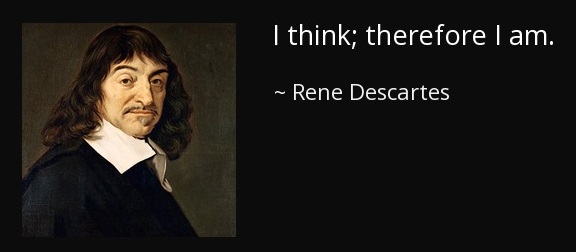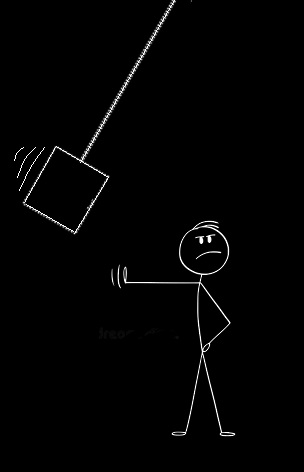One Beyond
By Anthony Casperson
5-1-21
Earlier this week, I was reminded of a statement often discussed in philosophy class. It’s one of those basic elements of philosophy that underpins much of Western thought. And several other presuppositions that pervade through our culture find a lineage through this single sentence.
“I think, therefore, I am.”
French philosopher Rene Descartes originated the statement in 1637. He attempted to find the base position that we can know for certain. The lowest common denominator of what we can be sure is true. Essentially, if thinking occurs, then an existence has to be thinking. And that being is the one thinking it.
I.
Descartes began his understanding of philosophy with doubt (something that tends to be true of this philosophical statement’s progeny). The existence of something beyond the self can be doubted. Figments of imagination, hallucinations, misinterpretations of context. They all are possible. And the philosopher would say that since these possibilities exist, then we can’t be sure of their reality. Or the reality of anything outside of the self.
Thus, he would claim, the only truth that exists is our own cognitive ability. We can’t even be sure if other people actually exist because their thinking processes might just be something imagined by us. Truth starts and ends with the self. At least, according to the doubting presupposition prevalent in our culture.
I came to be reminded of this statement as I was reading through Isaiah 47. The context of the chapter shows God, through the prophet Isaiah, proclaiming judgement against the Chaldeans (a.k.a. the Babylonians) for their over-extension of justice against the Southern Kingdom of Judah.
(As a side note, at the time Isaiah wrote these words, Babylon wasn’t even a world superpower. And it would be over 100 years after this clear and precise prophecy of future events, that the Babylonian captivity of Judah would happen, let alone the eventual, but swift, demise of Babylon at the hands of the Medo-Persian Empire.)
One of God’s direct charges toward these yet-to-be-born individuals is repeated twice. And here’s where I was reminded of Descartes.
Both verses 8 and 10 of Isaiah 47 reveal the Babylonians saying, “I am, and there is no other.”
In the Hebrew, it could also be translated as, “I am, and I am the furthest extent.” These Babylonians would be claiming that reality, judgement, and existence all start and end with them. There is no truth beyond them. Nothing greater.
The single word translated into “and there is no other” finds one-third of its appearances throughout the entire Old Testament in the book of Isaiah. And nearly half of those times it’s used in the book are coagulated in chapters 45-47.
In this close context, we see God repeatedly stating that he is, and there is no other. There’s nothing beyond him. Nothing better than him. And if we look at the early verses of Isaiah 45, we see a close connection with God’s place as Creator of reality. He forms the light and the darkness. He makes well-being and creates calamity. He, Yahweh, the great I Am, the Being One, is the start and end of all created reality.
Thus, when we see the Babylonians claiming, “I am, and there is no other,” they’re claiming the place of God. Reality is only what they decide it is. Truth isn’t something objective beyond them, because they believe that there is no truth beyond them.
God promises judgement for this usurping of role nearly a century before they even do it. And it did eventually happen just as he spoke through Isaiah.
This judgement of God upon the Babylonians is troubling when we consider that much of our culture believes that truth is subjective. There’s “your truth” and “my truth” but there is no truth beyond the self. I becomes the start and end point of truth.
If the only truth we can know for certain is the self, then an individual’s “truth” really does find it’s end in them. There’s nothing beyond them. But if there’s truth created by another Being who is far beyond the self (a great I Am, perhaps), then truth has to find a greater extent beyond the human self. And this is what the Isaiah and many other books of the bible state to be true.
And just maybe, we should let that One state what truth is, believing his greatness and power. Because reality will always hit us in the face, whether we doubt its existence or not.




